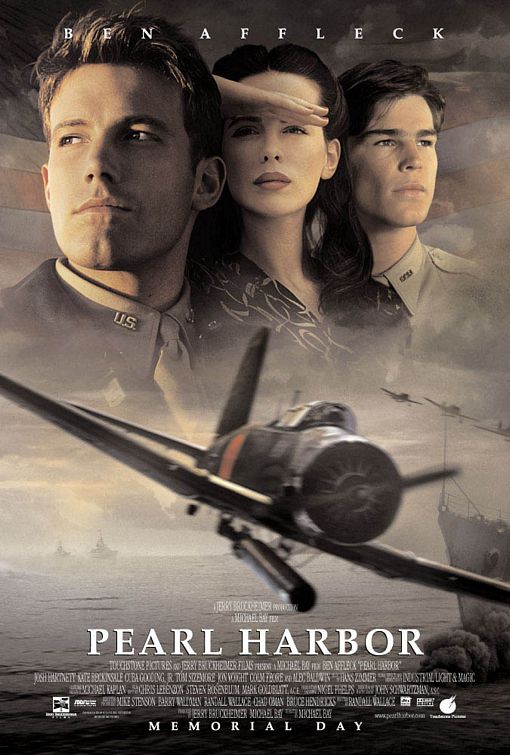“Brotherhood of Heroes”

| None | Light | Moderate | Heavy | |
|---|---|---|---|---|
| Language | ||||
| Violence | ||||
| Sex | ||||
| Nudity |
What You Need To Know:
PEARL HARBOR is a love letter to the “brotherhood of heroes” who survived the deadly Japanese attack on Dec. 7, 1941 and went on to defeat National Socialism in Japan. Interwoven within this mythic story of tragedy and triumph is a sometimes hokey love triangle and a Saturday matinee tale of youthful heroics. Not always successful, PEARL HARBOR is still a spectacular, redemptive piece of filmmaking. Regrettably, it contains plenty of foul language and some implied sexual immorality
Content:
(BB, PPP, CC, RH, Ro, Pa, LLL, VV, S, N, M) Moral worldview with strongly patriotic & solidly Christian, redemptive elements undermined by mild revisionist history (mostly meant to move story along & provide stereotypical entertainment), Romantic elements &, worst of all, some pagan elements including foul language, sexual immorality & image of Japanese Buddhist shrine; about 32 obscenities, 11 strong profanities & 18 mild profanities; lots of action & war violence with slight blood including explosions, gunfire, planes chasing one another, boats sinking, planes crashing, & men drowning, plus some intense hospital scenes including burn victims & nurse uses finger to stop blood flowing (but scene is not graphic); implied fornication; partial nudity; alcohol use; smoking; and, revenge & lust.
More Detail:
Ben Affleck and Josh Hartnett star as two childhood buddies, Rafe McCawkey and Danny Walker who dream of flying. They join the United States Air Force at the dawn of World War II. Rafe falls in love with a Navy nurse, Evelyn Johnson, played by Kate Beckinsale, but goes away to join an American squadron of volunteer pilots in England fighting the Germans. When his plane crashes in the sea, Rafe is presumed drowned.
Three months later in Pearl Harbor, Evelyn is still pining for Rafe when she meets Danny, who’s also been assigned to Pearl. Cautiously, the two young people console themselves over the loss of their friend by falling in love. A night of passion leaves Evelyn pregnant. On the eve of the attack on Pearl Harbor, Rafe suddenly appears after hiding from the Germans in occupied France. His sudden reappearance sets off a chain reaction of emotions, interrupted by explosive world events as Japan finally sends its pilots to destroy the American fleet at Pearl.
PEARL HARBOR is immensely satisfying as a spectacle and as an historical re-enactment of the early days of World War II. Director Michael Bay (ARMAGEDDON) and his team do a spectacular job of recreating the attack on Pearl Harbor and the Doolittle bombing raid on Tokyo in the spring of 1942. The movie is a little bit flat, however, in its depiction of the love triangle and in the youthful heroics displayed by its two main heroes. The dialogue in the script, and the twists and turns of the story, could use some touching up, if not rethinking. It’s all somewhat predictable at times, though the actors seem to do the best they can with the material. A subplot involving a black Navy cook, played wonderfully by Cuba Gooding, Jr., helps relieve these problems. Also helping greatly, of course, is the incredible verisimilitude which the filmmakers apply to their subject.
PEARL HARBOR contains some solid moral, Christian and redemptive elements, combined with the usual American patriotism which Michael Bay seems to apply to some of his movies. For example, although his friend Danny makes the opposite decision, Rafe decides to keep his affair with Evelyn chaste. The movie rewards his efforts in the end, which seems to validate his good moral stance. Thus, although PEARL HARBOR plays like the sexually immoral movie TITANIC at times, it skirts around this lack of moral purity in the end. The ending to PEARL HARBOR is redemptive in other ways, which will be left unsaid so as not to spoil it for potential viewers.
Despite these positive aspects to PEARL HARBOR’s worldview, the movie includes plenty of foul language. Although there are no “f” words or really filthy sexual language, there are about 32 obscenities and 11 strong exclamatory profanities. The movie also includes a scene of implied fornication and scenes where it’s clear that the soldiers and nurses have some lustful plans on their minds. Unlike other recent war movies, however, the war violence in PEARL HARBOR is not extremely bloody and gruesome. It still manages to be sufficiently tragic. In that respect, we hope PEARL HARBOR lights the way toward more responsible and more interesting filmmaking from Hollywood.


 - Content:
- Content: 




